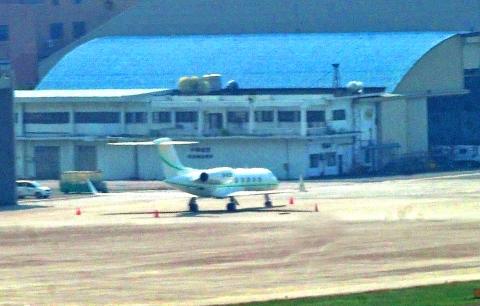Opposition lawmakers were demanding answers from the judiciary and aviation authorities yesterday after a private jet belonging to the owners of Ting Hsin International Group (頂新集團), which is under investigation for the ongoing cooking oil scandal, flew from Taiwan to China.
Civil Aeronautics Administration (CAA) Director-General Shen Chi (沈啟) confirmed yesterday that a Gulfstream G450 private jet belonging to the Wei family departed from Taipei International Airport (Songshan airport) at about 9pm on Wednesday headed for China.
Answering questions at the legislature in Taipei, Shen also confirmed that Wei Ying-chou (魏應州), a senior Ting Hsin executive and eldest of the four Wei brothers, was on board the private aircraft.

Photo: Fang Pin-chao, Taipei Times
According to a Ting Hsin statement, Wei Ying-heng (魏應行), the youngest Wei brother, had left Taiwan for Beijing on board another of the family’s Gulfstream jets a few days ago.
The news sparked a furor because it was seen as an attempt by the Wei brothers to evade prosecution and remove their assets from Taiwan — the two Gulfstream G450 jets have a combined market value of US$50 million.
The four Wei brothers are the principal owners and senior executives of Ting Hsin and Wei Chuan Foods Corp (味全食品工業), which have been found to have sold adulterated oil and food products for many years.
Democratic Progressive Party Legislator Tsai Huang-liang (蔡煌瑯) was furious.
“The Wei family’s private jets flew to China in front of everyone’s eyes. It is a clear attempt to hide their assets before the judiciary seizes them,” Tsai said.
Tsai said that it had been known a few days earlier that the two private jets were at the airport, but the second aircraft left Taiwan just before prosecutors applied to seize the Wei family’s assets on Wednesday evening.
“The Ministry of Justice allowed them to escape. It’s gross negligence by the government,” Tsai said.
Tsai added that he and other legislators had requested that prosecutors apply to seize the two jets on Monday, yet nothing had been done.
In response, CAA officials explained that the two jets were registered in China and as long as they complied with regulations, the aircraft could land and take off at the airport.
The CAA had contacted the Taiwan High Prosecutors’ Office on Wednesday after receiving the jet’s flight plan and were told the jet was not on the list of assets for seizure and that no one onboard was under investigation, officials said.
Besides the prosecutors’ office, CAA officials said that prior to the jet’s departure they also informed the Ministry of Justice and the National Immigration Agency, and after receiving consent and clearance the jet was allowed to fly to China.
The Ministry of Justice issued a statement yesterday saying that if prosecutors apply to seize the jets, the ministry can request the assistance of the Chinese government to detain the aircraft.
In a surprise move last night, one of the jets returned to Taipei International Airport from China at 8:30pm, Shen said.
Ting Hsin also confirmed the news, but it declined to reveal who was on board.

CHAOS: Iranians took to the streets playing celebratory music after reports of Khamenei’s death on Saturday, while mourners also gathered in Tehran yesterday Iranian Supreme Leader Ayatollah Ali Khamenei was killed in a major attack on Iran launched by Israel and the US, throwing the future of the Islamic republic into doubt and raising the risk of regional instability. Iranian state television and the state-run IRNA news agency announced the 86-year-old’s death early yesterday. US President Donald Trump said it gave Iranians their “greatest chance” to “take back” their country. The announcements came after a joint US and Israeli aerial bombardment that targeted Iranian military and governmental sites. Trump said the “heavy and pinpoint bombing” would continue through the week or as long

TRUST: The KMT said it respected the US’ timing and considerations, and hoped it would continue to honor its commitments to helping Taiwan bolster its defenses and deterrence US President Donald Trump is delaying a multibillion-dollar arms sale to Taiwan to ensure his visit to Beijing is successful, a New York Times report said. The weapons sales package has stalled in the US Department of State, the report said, citing US officials it did not identify. The White House has told agencies not to push forward ahead of Trump’s meeting with Chinese President Xi Jinping (習近平), it said. The two last month held a phone call to discuss trade and geopolitical flashpoints ahead of the summit. Xi raised the Taiwan issue and urged the US to handle arms sales to

State-run CPC Corp, Taiwan (CPC, 台灣中油) yesterday said that it had confirmed on Saturday night with its liquefied natural gas (LNG) and crude oil suppliers that shipments are proceeding as scheduled and that domestic supplies remain unaffected. The CPC yesterday announced the gasoline and diesel prices will rise by NT$0.2 and NT$0.4 per liter, respectively, starting Monday, citing Middle East tensions and blizzards in the eastern United States. CPC also iterated it has been reducing the proportion of crude oil imports from the Middle East and diversifying its supply sources in the past few years in response to geopolitical risks, expanding

Pro-democracy media tycoon Jimmy Lai’s (黎智英) fraud conviction and prison sentence were yesterday overturned by a Hong Kong court, in a surprise legal decision that comes soon after Lai was jailed for 20 years on a separate national security charge. Judges Jeremy Poon (潘兆初), Anthea Pang (彭寶琴) and Derek Pang (彭偉昌) said in the judgement that they allowed the appeal from Lai, and another defendant in the case, to proceed, as a lower court judge had “erred.” “The Court of Appeal gave them leave to appeal against their conviction, allowed their appeals, quashed the convictions and set aside the sentences,” the judges